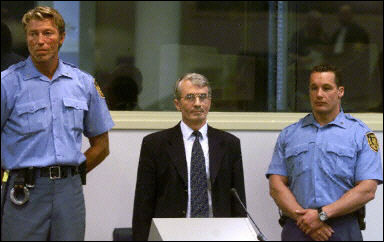Home
USE OF FORCE ONLY WITH PRIOR APPROVAL
Commander of the 3rd Corps had to take measures when the mujahedin started undermining his authority and the character of the Corps’ warfare, but he could use force only with prior approval of the politicians, says the defense expert witness for military matters at the trial of Hadzihasanovic and Kubura
 Enver Hadzihasanovic in the courtroom
Enver Hadzihasanovic in the courtroom When the foreign nationals in Central Bosnia transformed from humanitarian aid workers to an armed group and started “undermining the authority of the commander of the BH Army 3rd Corps and the character of the Corps’ warfare”, the commander had to take measures, says the defense military expert Vahid Karavelic, in his testimony at the trial of Enver Hadzihasanovic and Amir Kubura. The charges against them include the failure to prevent and punish the crimes committed by the mujahedin in their area of responsibility.
From what Karavelic said, it follows that the commander of the 3rd Corps did exactly what he was supposed to do and what he was able do with regard to the mujahedin. "The commander will seek information about those men, report to his superiors and ask that their status be regulated or that he be authorized to assist the civilian police, which has jurisdiction over such matters, in solving the problem by armed response,” the witness said. According to the evidence presented by the defense, Hadzihasanovic sought precisely such authorization from the Supreme Command in his letter in June 1993.
The prosecutor claims that Hadzihasanovic had to have been much more resolute in his attempts to disarm the foreigners, but failed to do that because the BH Army had links with them. The defense contends that the 3rd Corps commander was limited in his options when it comes to intervening against a group that was not under his command and that enjoyed the support of a part of the population. “The corps commander must not use force without the approval of the political leadership”, if there is a possibility that it may lead to chaos, Karavelic said. As an example, he said that as the commander of the 1st Corps he dealt with the disobedient brigades only after he received the green light from Alija Izetbegovic; and it was not easy to get.
The BH Army military command ordered the 3rd Corps at one point to send the foreigners to Igman mountain, and if they failed to comply, to disarm them. But, the witness says “this order was only of formal nature” and that it should have been “issued in a different way”. The 3rd Corps commander did not have enough information about the numbers of the foreigners and about how to carry out that action in a situation in which he was already fighting at two fronts, against the VRS and the HVO.
Noting that in the summer of 1993 the 3rd Corps was in an “impossible situation”, Karavelic testified at length about the military operations this corps had to carry out in order to hold the territory and maintain control of the vital routes in its area that the HVO was trying to take.
Large parts of the 3rd Corps area overlapped with the Central Bosnia Operative Zone of the HVO and with one of the VRS zones. “There were only seven municipalities in the entire BH which had not been declared either part of the Serb autonomous regions or Herceg-Bosna,” Karavelic added, listing them as Velika Kladusa, Cazin, Visoko, Breza, Srebrenik, Tuzla and Kalesija.
The testimony of the defense military expert will continue next week when he will be examined by the prosecutor.
Linked Reports
- Case : Hadzihasanovic & Kubura - "Central Bosnia"
- 2005-03-22 A COMPLEX SITUATION FOR COMMANDERS
- 2005-02-16 WHO IS RESPONSIBLE FOR PROSECUTING CRIMES?
- 2005-02-09 INFORMATION OR DISINFORMATION
- 2005-03-29 COMMANDER “IN THE LEGAL SENSE”
- 2005-03-30 A SUBJECTIVE OR OBJECTIVE APPROACH?
- 2005-04-11 SIMPLE DEFENCE AGAINST "ONE-DIMENSIONAL ACCUSATIONS"
